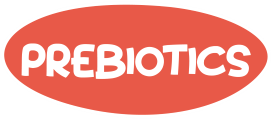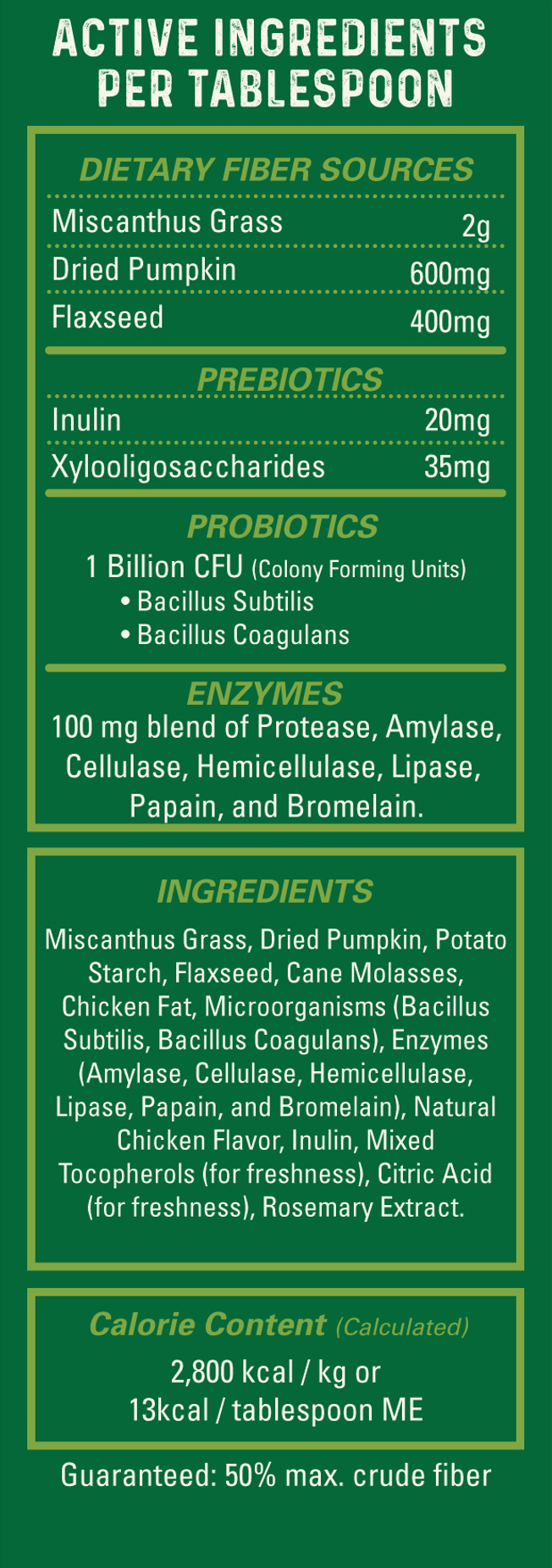All-Natural Ingredients
The ingredients in Bernie’s Perfect Poop are simple, clean and 100% natural. We serve Bernie’s Perfect Poop to our dogs every day and worked hard to only use ingredients that we believe in and are comfortable serving to our own dogs. Read more about each ingredient below.
Complete 4-in-1 formula
Four essential digestion ingredients unite to heal and maintain your dog’s gut

3g fiber / tablespoon serving
Fiber helps provide the ideal stool
Miscanthus grass
Pumpkin
Flax seed

20mg prebiotics / tablespoon
Prebiotics support the growth of favorable probiotics
Inulin

1 billion CFU / tablespoon
Probiotics are beneficial microorganisms support a healthy digestive tract and immune system
Bacillus Subtilis *
Bacillus Coagulans *
Hardy spore-forming probiotics withstand harsh stomach acids to reach your dogs intestines

100mg / tablespoon
Enzymes break down food and increase nutrient absorption
Protease
Amylase
Cellulase
Hemicellulase
Lipase
Papain
Bromelain
Active ingredients
Miscanthus grass

- An all-naturally grass grown in Missouri and Arkansas, USA
- Pronunciation: (\muh·skan·thuhs\)
- Type: Non-Genetically Modified, naturally grown
- Other names: Saccariflorus and Sinensis, native to Asia
What is miscanthus grass?
Aside from being the primary ingredient in Bernie’s Perfect Poop, Miscanthus Grass is a natural and nutritional fiber.
Native to Asia, the Miscanthus Grass used in Bernie’s Perfect Poop is an all-natural grass grown in the United States in Missouri and Arkansas. Miscanthus is grain-free, gluten-free and mechanically processed without chemicals. It is NOT a by-product and, and in fact, is purposely grown as a premium nutritional fiber for pet foods and supplements.
The formal name for Miscanthus Grass is Miscanthus Giganteus. It’s a C4 perennial grass that can grow 15 feet tall yearly. Perennial grasses can be classified as either C3 or C4, and that has to do with the different pathways that plants use to get carbon dioxide during their photosynthesis process. C3 plants are not as adapted to warm or hot seasonal conditions, and while they may be more tolerant to frost when compared to C4 grades, they tend to be a lower feed quality than C4 grasses. [1]
Why can miscanthus grass be good for dogs?
Miscanthus grass is good for dogs because of how much dietary fiber it contains. Dietary fiber is important for helping your dog digest their food at the appropriate speed and with optimal nutrient absorption. Miscanthus is about 85% dietary fiber, and superior when compared to other natural fiber sources.
Many dog foods on the market are grain-free, meaning that the fiber your dog is getting from his food is simply not enough. Grain-free foods are primarily meat-based and a premium supplement like Miscanthus can help to give your dog the fiber they need to aid in having the healthiest gut they can.
More and more research continues to show how gut health is linked to overall health, and if gut health is an issue (dysbiosis or leaky gut), your dog’s overall health can also be in jeopardy. Visible signs like diarrhea, constipation, excess gas and weight gain can mean your dog’s digestive tract isn’t working as it should. If that’s the case, they may be unable to get the necessary vitamins, minerals and nutrients that they should, which can lead to a whole host of other health situations. High-quality fiber supplements like Miscanthus Grass can help your dog digest properly, absorb properly and have better overall gut health.
Even if your dog doesn’t show signs of poor gut health, maintaining supplements of high-quality fiber may boost their immune system and lead to overall better health. [2]
What are the specifics about miscanthus grass in Bernie’s Perfect Poop?
The Miscanthus Grass in Bernie’s Perfect Poop is grown by small, sustainable farms in the Midwest. Unlike other fiber products (even those for dogs), there is no mechanical processing. Miscanthus is mechanically ground down from the plant into powdered fiber, and no chemicals are used. It is grown specifically for its content and not as a byproduct.
It’s also a highly environmentally-friendly ingredient, growing as a perennial crop and capturing carbon in its root system. That means it’s carbon negative, and it doesn’t require any pesticide or herbicides to thrive.
It’s gluten-free and high in insoluble fiber and natural prebiotic XOS (xylooligosaccharides). Xylooigosaccharides are prebiotics that consist of sugar oligomers from xylose units. Bernie’s Perfect Poop uses enough Miscanthus Grass to have significant XOS included, and this helps because XOS effectively stimulate the growth of good probiotics (feed them). Unlike many other prebiotics, though, they do this without some of the unpleasant side effects prebiotics may sometimes have (bloating, gas, abdominal pain) as they ferment and feed the good probiotics.
How is miscanthus grass used in Bernie’s Perfect Poop?
Common Fiber supplements can be messy. Often, they’re powders that blow all over the place or a large tablet you have to trick your dog into eating. Bernie’s Perfect Poop supplements your dog with premium Miscanthus Grass in Bits they LOVE to eat. Dogs find the Grass Bits delicious (it doesn’t hurt that they taste like cheese or chicken!), and many will even eat the bits right out of your hand as a treat.
For more information on miscanthus grass, check out these articles:
The Breakthrough Fiber Revolutionizing The Pet Food Industry
Finding Quality Sources of Fiber For Your Pet
How MFiber Is Changing Pet Food
Dried pumpkin
- Pumpkin is a FRUIT and not a vegetable
- Pronunciation: (\puhmp·kn\)
- Winter-Squash
- Other names: Gourd, Fruit, Squash, Cucurbita pepo
What is pumpkin?
A pumpkin is a fruit that belongs to the Cucurbita Pepo family, along with 700 other squash varieties. It’s what comes from a seed-bearing structure of flowering plants, so it’s fruit, but because it’s more savory than sweet, it is often thought of as a vegetable.
It’s also incredibly packed with digestion-regulating fiber, and it’s high in water content, which is good for hydration. It’s been shown to settle upset tummies and ease constipation and diarrhea.
How does pumpkin help your dog?
The soluble fiber content in pumpkin is excellent for helping your dog’s stool as it goes through the digestive tract. It dissolves in water and other digestive fluids, and as it does, it forms a gel-like consistency that passes right through your dog’s digestive tract. As it makes it to your dog’s colon, it feeds the good bacteria in his gut.
As the fiber from pumpkin ferments in your dog’s digestive system, it also creates beneficial fatty acids that give your dog’s cells energy. Pumpkin also stimulates intestinal sodium and water absorption while it also lowers your dog’s large intestines’ pH level. [1] This allows the necessary nutrients and the good probiotics of your dog’s gut to thrive and feed the dog’s microbiome.
Pumpkin can also be a safe way to help your dog lose weight. The fiber in the pumpkin not only regulates digestion, but offers your dog a feeling of fullness and that may help them crave less (and take in fewer calories).
Nutritionally speaking, pumpkin adds nutrients to your dog’s diet. Pumpkin is packed with beta-carotene, iron, zinc, Vitamins A, E and C and potassium. All of these properly absorbed add to your dog’s overall gut health and immunity, which adds to their general health and well-being.
Why can pumpkin be good for dogs?
Pumpkin is an excellent supplement for dogs even when they’re not suffering from gastric distress. Pumpkin is loaded with Vitamin A. Vitamin A is important for healthy eye and brain development in dogs. When combined with Vitamins E and C and the other antioxidants in pumpkin, dogs get overall immune support.
Pumpkin is also rich in Vitamin E, beta-carotene and potassium. Vitamin E keeps free radicals that can trigger abnormal cell growth in your dog away and promote overall heart health and keep internal organs in good shape. Carotenoids are what keeps your dog’s skin and eye health in optimal condition and potassium helps keep your dog’s muscles well-maintained. Iron in pumpkin can also keep your dog’s hemoglobin levels where they are optimal for overall immune strength and health.
For more information on pumpkin benefits for dogs, check these articles out:
Flaxseed
- Flaxseeds are the golden yellow to reddish-brown seeds of flax–a food and fiber crop from Southern Europe and Asia
- Pronunciation: (\flak·seed\)
- Flaxseed contains soluble fiber and oil
- Other names: Linum usitatissimum, lignan and Alasi
What is flaxseed?
Flaxseed is the seed of a flax plant. Flax is a food and fiber crop that came from Southern Europe and Asia. Flaxseeds are typically reddish-brown to golden yellow. They contain phytoestrogens, as well as soluble fiber and oil. Flaxseed oil has omega-3 fatty acid alpha-linolenic acid (ALA) and flaxseeds have been used as food or medicine since 5000 BC.
As a medicine, flaxseed is used for everything from diabetes to high cholesterol and high blood pressure and swelling and inflammation of the kidneys in people with lupus. It’s used to treat obesity and breast pain and is incredible for healthy gut microbiomes as a soluble fiber.
What does flaxseed do for dogs?
Flaxseed is an incredible source of dietary fiber and omega-3 fatty acids. The fiber comes from the flaxseed seed coat, and researchers believe this fiber binds with cholesterol in the intestines and prevents the cholesterol from being absorbed (thus lowering unhealthy cholesterol levels) [1]. Flaxseed is widely known to help curb appetite as the fiber makes your dog feel less hungry and therefore want less food. Flaxseed also helps your dog’s gut absorb nutrients appropriately as food travels through his intestines.
Flaxseed has been shown to make platelets, which are the blood cells that are involved in clotting, less sticky. Researchers seem to believe this may lower the risk of atherosclerosis (artery hardening).
Why is flaxseed good for dogs?
There are several benefits of flaxseed for dogs. They include:
- Healthy coat and hair. Flaxseed helps your dog get the nutrition he needs from the food you give, and this is essential for a healthy coat and hai. When your dog doesn’t get the right balance of essential nutrients, their skin, health and coat may suffer.
- Autoimmune, allergic or inflammatory health conditions. Flaxseed increases the omega-3 fatty acid intake of your dog, and that may help improve their immune system, and help lower allergic or inflammatory health reactions. Flaxseeds have lignans, which are antioxidants that help your dog’s immune system work to its potential. When your dog’s immune system is at its healthiest, he can better navigate through inflammation, including to the immune system, and that can bolster his ability to fight infection.
- Healthy joints. The alpha-linolenic acid (ALA) that helps your dog’s skin and coat can also help your dog’s range of mobility and joint health. Combined with lignans that fight inflammation, regular doses of flaxseed may give relief for minor joint problems, and keep their joints mobile as a maintenance plan.
- Adrenal Issues. The high content of lignans in flaxseed also may help dogs with adrenal issues. Flaxseed hulls have SDG lignan, and levels of those are nearly 20 times higher than the entire rest of the flaxseed itself. The lignans can lower your dog’s estradiol by inhibiting aromatase enzymes and by lowering cortisol levels.
- Kidney Issues. The fatty acid omega-3 in flaxseed can help reduce kidney inflammation. This will also help increase blood flow to other organs and help keep their lipid levels up. Higher lipid levels mean they can increase their triglyceride production, which can help extend their kidney health and life.
- Healthy Gut. Flaxseed is an adaptable fiber. It can support your dog when he’s constipated by helping absorb water and bulk his stool up to make it pass easier, and it also can help firm runny stool up when he’s suffering from diarrhea. The fiber your dog gets from flaxseed helps move food through his digestive tract appropriately for maximum nutrient absorption and gut health.
What you should know about flaxseed
Flax is an oil seed. Oilseeds are primarily grown for their oil, and if flax is milled (or ground) improperly, the oils inside will go rancid and smell like linseed oil. Think paint stains or varnishes, or even wood preservatives. What you should know about flaxseed is that not every flaxseed ingredient is created and ground equally.
Our supplier has a proprietary and tested process that keeps the flax seed we use safe and from going rancid for at least 24 months from the date of manufacture. Our supplier’s Next Generation grain plant is the only SQF3 (Safe Quality Food) certified grain plant in the world. At their grain facility in Sioux Falls, SD, they have a specific way of milling flax so that samples of each lot maintain freshness and safety for at least 24 months, and no antioxidants are included.
Additionally, they have a patented process for seed selection and sorting to ensure that sourced flax meets their high standards. This process is called MeadowPure and it ensures that good seeds are sorted from rejected, broken, green, etc. seeds and that allows an unmatched purity level of 99.95%. This makes the flax we use in Bernie’s Perfect Poop the most stable flax in the industry, and the best for your dog.
For more information on flaxseed benefits for dogs, check these articles out:
Canine Cushing’s Disease and Lignans For Dogs
Flaxseeds For Dogs: Benefits and Uses
Inulin / fructooligosaccharides blend
- Inulin is a type of oligosaccharide called a fructan
- Pronunciation: (\i·nyuh·luhn\)
- Inulin is indigestible
- Other names: Oligofructose, also called fructooligosaccharides (FOS)
What is inulin?
Inulin is a type of soluble fiber that is found in fruits, vegetables and herbs. It’s a fructan, which means that it is a prebiotic. Prebiotics feed good bacteria in the guts. As a fructan, it’s made of chains of fructose molecules linked together in such a way that the small intestine can’t break them down.
Derived from chicory sources, Inulin helps improve digestive health by promoting beneficial changes and growth in your dog’s microbiome and encouraging favorable growth in their gut. It promotes mineral absorption as food moves through the digestive tract, and keeps the good bacteria in your dog’s gut fed.
What does inulin do for dogs?
Because Inulin is not digested or absorbed in your dog’s stomach, it goes to his bowels. There, the good gut flora and probiotics of your dog’s gut feed on it, and thrive as they grow. The probiotics and good bacteria Inulin feeds improve your dog’s bowel function and overall health. Inulin also decreases your dog’s propensity to make certain kinds of fats, including cholesterols and triglycerides. Inulin can help your dog lose or stay a healthy weight and help with constipation, diarrhea, and diabetes.
Inulin is a fermentable, non-digestible carbohydrate. It allows specific beneficial changes in the gut microflora of its host (your dog). [1] Inulin ferments into metabolizable energy for gut microbes and also releases gasses and short-chain fatty acids that are beneficial for your dog’s gut. [2]
For more information about Inulin, check these articles out:
Xylooigosaccharides
Xylooigosaccharides are prebiotics that consist of sugar oligomers from xylose units. Bernie’s Perfect Poop uses enough Miscanthus Grass to have significant XOS included, and this helps because XOS effectively stimulate the growth of good probiotics (feed them). Unlike many other prebiotics, though, they do this without some of the unpleasant side effects prebiotics may sometimes have (bloating, gas, abdominal pain) as they ferment and feed the good probiotics.
Cane molasses
A small amount of natural cane molasses adds many benefits to a dog’s health, provided it’s a quality molasses without chemicals (artificial sweeteners like xylitol and others).
Molasses offers several nutrients to your dog, including Vitamin B6, Iron, Calcium, Potassium, Magnesium, Manganese, Selenium and Copper. The calcium alone may help promote healthy bones and fight against osteoporosis, and like many humans, dogs are often magnesium deficient.
Molasses can help enhance your dog’s energy and may add a boost to his immune system, and holistic pet experts recommend it for hair and skin improvement too!
The molasses we use in Perfect Poop is a premium, high-quality molasses. It comes from dried cane sugar that is cut, crushed, boiled and concentrated into a nutritive sweetener. It’s unsulphured and is a natural source of salts and essential minerals and vitamins. It has antioxidant properties and is also a humectant that helps retain moisture and allows Perfect Poop to stay fresher longer. An added bonus? Dogs love the taste of it.
Microorganisms (Bacillus Subtilis and Bacillus Coagulans)
- Bacillus Subtilis and Bacillus Coagulans are types of spore-forming strains of Bacillus probiotics. They are known for their incredible ability to survive harsh gastrointestinal conditions and bring health benefits to their host.
- Pronunciation: (\buh·si·luhs suhb·ti·luhs\) and (\buh·si·luhs kow·a·gyuh·luhnz\)
- Often compared to other Bacillus genomes and Lactobacillus, though believed to be hardier in a digestive system.
- Other names: Bacillus, Probiotics, Probiotic Bacteria, Gram-positive spore-forming Rod
What are Bacillus Subtilis and Bacillus Coagulans?
Bacillus coagulans and Subtilis are types of bacteria. Similar to popular lactobacillus and other probiotics, they are the ‘good’ or ‘beneficial’ bacteria that help keep a microbiome healthy and balanced. These probiotics form spores, and that’s an important difference from other lactic acid-producing bacteria like lactobacillus or bifidobacterium. The spores contribute to a flourishing microflora in your dog’s gut. Their ability to generate spores during the reproductive life cycle means they’re able to go dormant during harsh gut conditions where other probiotics may die off. Both Bacillus Coagulans and Subtilis are robust probiotics that can stand against high levels of stomach acids. That is why they’re highly effective in aiding against stomach distress and other immune deficiency.
Other probiotics may simply not be able to withstand your dog’s stomach acid and feed his gut. You could be paying a pretty penny for ‘probiotics,’ but if they can’t stand up to your dog’s gut environment, they’ll have a difficult time flourishing and keeping that gut balanced.
What do Bacillus Subtilis and Bacillus Coagulans do for dogs?
The gut microflora is extremely important to your dog’s overall health. A thriving microbiome will have intestinal flora that acts as a primary barrier from pathogens. Virus and disease will try to disrupt the balance of your dog’s gut, but probiotics will reduce that interference. Probiotics are living microorganisms–bacteria–that have beneficial effects on your dog’s gut by preventing viruses and bad bacteria from overtaking your dog’s gut. They prevent the colonization of bad bacteria in your dog’s digestive system, which can compete for the nutrients found in your dog’s food.
B. Subtilis and B. Coagulans are hardy bacteria, and as spore producers, able to replenish effectively for a healthy gut. Their ability to withstand harsh stomach environments makes them particularly effective at encouraging good bacteria growth and holding bad bacteria growth back. The Bacillus genus strain is especially resistant to bad microorganisms and survives in a variety of foods than do others of more typical probiotic species.
B. Coagulans are powerful against infectious diarrhea and aiding Irritable Bowel Syndrome in dogs and Inflammatory Bowel Disease in dogs. They’ve also been shown to be beneficial for those who have ulcerative colitis, Crohn’s disease and Clostridium Difficile.
B. Subtilis also aids in digestion, as well as contributing to the overall health of your dog’s digestive system. More research continues to show how probiotics facilitate wellness because of the gut-brain axis. Researchers have studied the effects on dogs of diet supplementation and found improvement in digestion, stool, and anxious behavior. [1]
For more information on Bacillus Coagulans and Bacillus Subtilis for dogs, check out these articles:
The Effects of Supplementation of Bacillus Coagulans and Bacillus Subtilis
Complete Genomes of B. Coagulans and B. Subtilis
Bacillus Subtilis Bacteria Probiotic Boosts Dog Digestion
Other active ingredients
- Protease
- Amylase
- Cellulase
- Hemicellulase
- Lipase
- Papain
- Bromelain
Other ingredients
- Natural chicken flavor – Our all-natural chicken flavor is made from sunflower oil and other natural flavors. It provides the meaty, savory grilled chicken taste that dogs and humans love without any of the chicken proteins that can cause allergic reactions in some dogs.
- Natural cheddar flavor – For better palatability, we add natural cheddar flavor. Unlike other ‘flavorings’ that may be combinations of ingredients and chemicals, our natural cheddar cheese flavor is simply real Cheddar cheese that’s been dried.
- Potato starch – Potato starch is the starch that is extracted from potatoes. It turns soft, light and powder as it dries out and is a good source of starch for dogs. It can improve the digestibility of nutrients, making absorption of the food you feed your dog more consistent and it can also help improve the stool quality. It’s typically considered more palatable than corn, which is often included in dog foods and supplements.
- Chicken fat – Chicken fat is not made of proteins, and therefore doesn’t trigger allergic reaction in dogs like chicken can. Fat isn’t made of proteins and it isn’t broken down into amino acids. Chicken fat is broken down in your dog’s digestive tract and fatty acids come apart from glycerol. These fatty acids then go through your dog’s lymph system and help give energy and fuel cellular growth and repair in your dog. Chicken fat is highly digestible and has high levels of Omega-6. This not only helps Perfect Poop be more palatable to your dog, but helps give essential fatty acids dogs can’t produce on their own.
- Mixed tocopherols – In order to slow spoilage, we include mixed tocopherols. Mixed tocopherols are a family of vitamin E compounds that are naturally found in nuts, fish, leafy green vegetables and vegetable oils. They are not synthetically created. Without tocopherols, the chicken fat included in Perfect Poop could oxidize and turn rancid. Tocopherols are antioxidants and help lock flavor in so palatability is prioritized.
- Rosemary extract – Rosemary is an herb that’s widely used in both human and dog foods. Its extract has an enticing and powerful smell and this helps invigorate the palatability of what its used in. Rosemary is often used for its medicinal properties as well. Rosemary extract may support your dog’s immune system with its antioxidant power and it contains antimicrobial qualities that help your dog’s microbiome stay balanced. This helps keep the digestive tract healthy.


